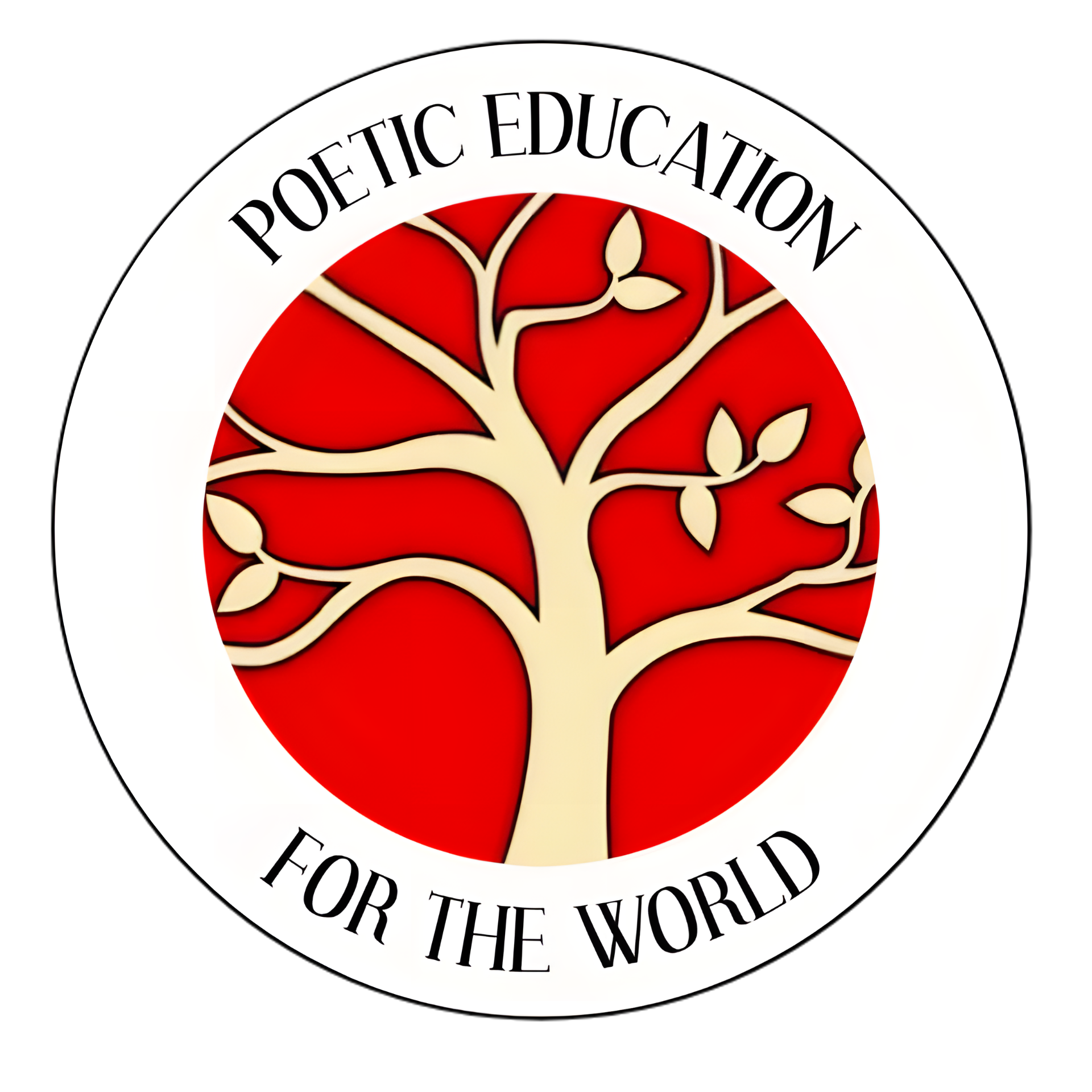
A la comunidad poética
¿Será posible ampliar nuestro horizonte y construir una mirada distinta de nosotros mismos?
¿Tomar conciencia del potencial que tenemos y movilizar
nuestras fuerzas para realizar cambios estructurales de carácter
universal en beneficio de la humanidad?
Es decir, una comunidad poética dispuesta a impulsar cambios en el sistema escolar en lo relativo a innovar en pedagogía, impulsando una nueva manera de abordar la poesía en el aula, en el contexto de una comunidad poética que toma conciencia de un mundo influido por parámetros distópicos, comprender que estamos situados donde el sistema imperante nos ha colocado, ante la cual deberíamos realizar acciones en busca de una renovación de las fronteras del mundo de la poesía, realizando un cruzamiento desde lo literarios hacia lo educativo, y en ese contexto crear instancias para cuestionar a la autoridad por el estado deplorable de la llamada "enseñanza de la poesía" que en la actualidad atrofia la sensibilidad poética de millones, y por lo tanto esforzarnos en detener esta tragedia, no solamente desde un punto de vista local o regional, sino desde una perspectiva global. Este gran tesoro (la poesía) merece un espacio importante en nuestro mundo, que en la actualidad no lo tiene, un tesoro desconocido por la sociedad civil y sus autoridades.
Comprender que como comunidad poética debemos cumplir un rol en el aula de modo permanente por medio del poeta educador, y orientar al sistema educativo de tal modo que la "enseñanza de la poesía" sea algo vivo.
Una mirada humanista
En un tono esperanzador, queremos presentar no un sistema cerrado o rígido de creencias. No queremos imponer una doctrina ni establecer una figura específica como guía única, sino que celebramos la pluralidad y la imaginación.
Hacemos un llamado a la acción colectiva más que una dependencia de un individuo. La poesía es una herramienta y puede estar al alcance de todos, y el cambio puede surgir desde lo humano.
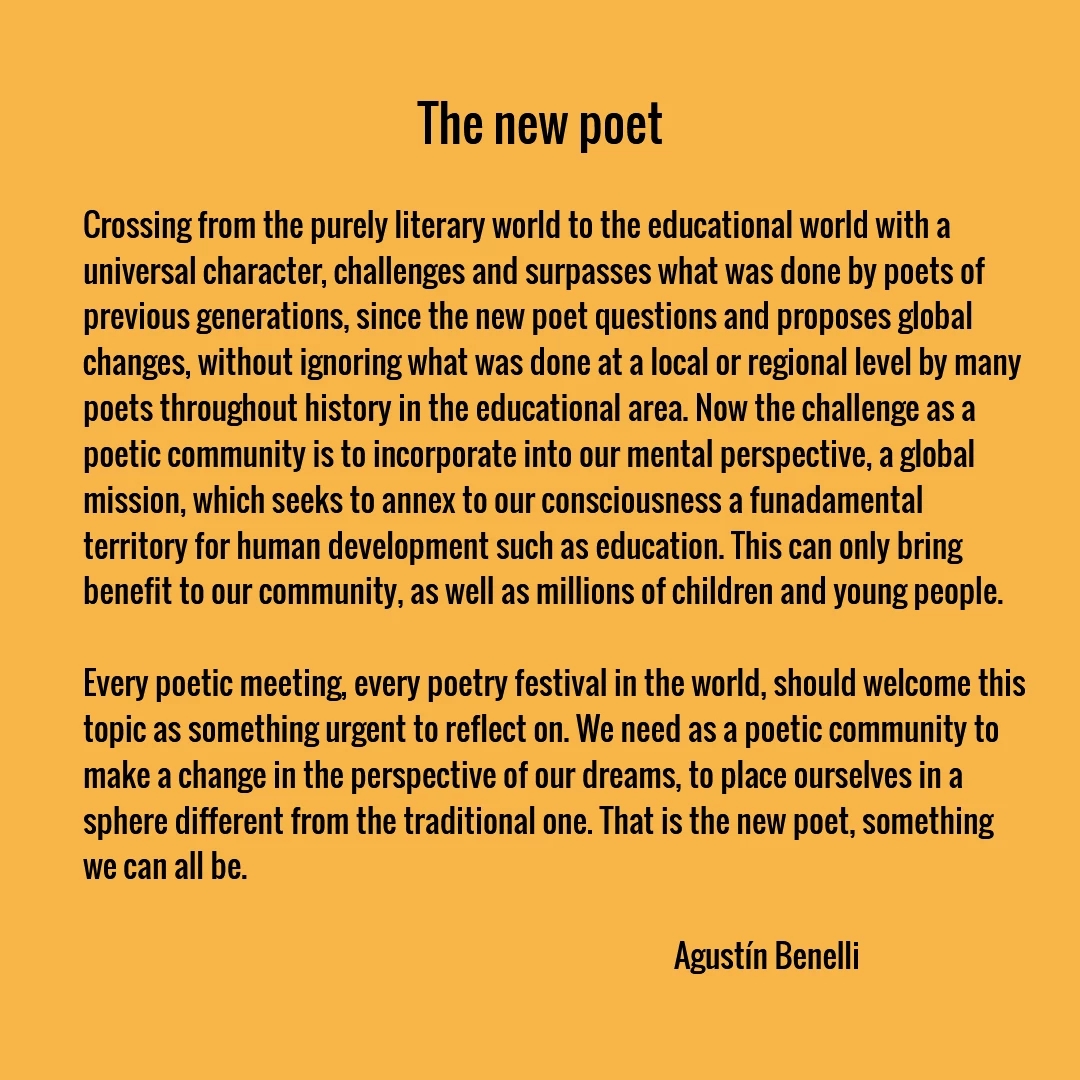
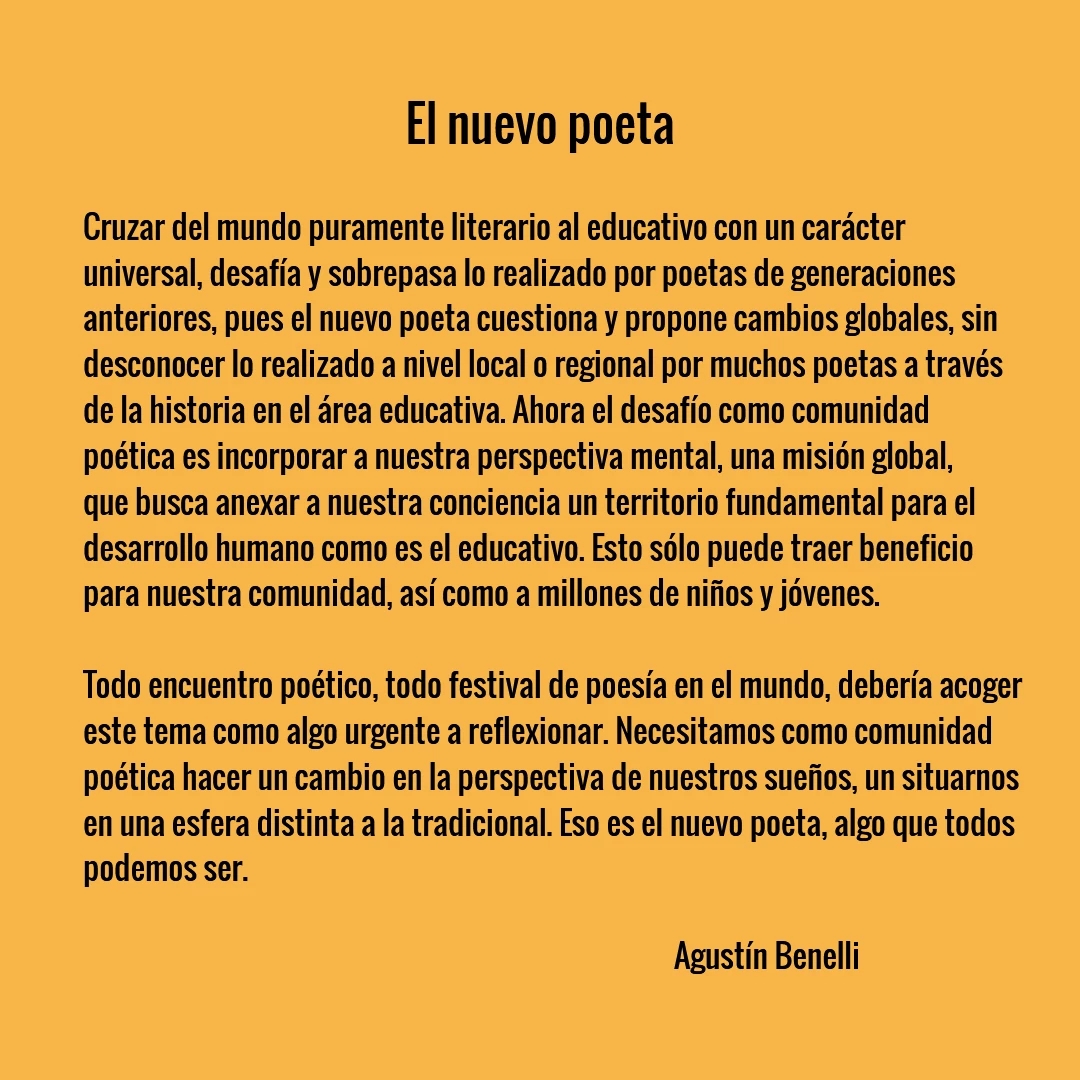


NUEVO POETA EN NUEVA YORK
A Mari-Lise Gazarian y sus estudiantes
En el subway
los carros atraviesan Manhattan sobre rieles
incandescentes
flechas en movimiento hacia los barrios de
Queens
Vengo en él
a diseccionar junto a ti y a tus estudiantes
el cuerpo del delito
nunca el poema
¿Qué es Poetry in Action?
Acaso la contraseña para conocer al poeta del
siglo XXI
la dimensión de una nueva especie en las calles
de Nueva York
Hemos de saber
que el nuevo poeta no llamará paz al conflicto
no dejará de señalar el crimen
de tantas salas de clases sin poesía
En las regiones de la orfandad
hará posible con la imaginación la manufactura
del poema
dará esperanza a la mano marchita
extirpará el metal de cada articulación
abrirá el corazón para expulsar la úlcera que
adormece el alma
Junto con los maestros
hallará la melodía para doblegar la marea
que conduce a los suburbios del pensamiento
suicida
En el linaje de las cosas sencillas
guiará a los grandes sueños
Aunque el escepticismo hace dudar del amor
en la hoja de papel la poesía hará su nido
porque en los intersticios de la mañana desea
habitar el lenguaje
y cuando entre en la sala de clases
la primavera no se marchará jamás
Que al descubrir el oasis
los jóvenes perciban un te amo
una escuela unida a la emoción del ser
que tirita
como un pez en el agua
en un territorio donde tal vez la humanidad
decide su destino
EL RELÁMPAGO NO SE PUEDE OCULTAR
Rimbaud, en su momento, hacia un llamado en su Carta a Paul Demeny al aprendizaje, a la apertura, a una vivencia poética mediante la cual el poeta se conecta con la poesía desde la experiencia propia y ajena y se hace parte de la poesía desde el hacer. De esta manera el 'nuevo poeta' se convertirá en testigo del acercamiento a la sensibilidad, al nacimiento del quehacer poético. En el poema de Agustín Benelli que introduce la descripción del nuevo poeta intitulado Un esqueleto sobre el pupitre, se lee: "No sabemos sus nombres//pero hace años colocaron un esqueleto sobre el//pupitre…
Así el poema se presenta más allá que como manifiesto, como un llamado a los poetas a devolver a la Poesía su lugar sobre el pupitre en la sala de clases. El 'nuevo poeta' lleva el deseo de cambiar la pedagogía y los caminos académicos de la inercia y/o la ausencia del ámbito productivo de la poesía[1]en el sistema educativo a la ebullición de la Poesía en educadores y estudiantes por igual.
De esta manera, el llamado a los poetas es un llamado a poder reciprocar su amor por la poesía y a ejercer el legítimo derecho de pedir cambios en el sistema educativo a nivel mundial, para incorporar en las aulas la educación poética con la clara intención de remover "el esqueleto colocado sobre el pupitre" y de llenar el vacío que sufren en nuestros días niños y jóvenes. Gabriela Mistral, la gran poeta chilena hacía un llamado a: "Enseñar siempre: en el patio y en la calle como en la sala de clase. Enseñar con actitud el gesto y la palabra." Esta actitud pedagógica es precisamente la esperanza que se abarca en el nuevo poeta. No como demanda, sino como actitud esperanzadora, como 'Ars poética' para construir un futuro viable para nuestros niños y para nuestros jóvenes que al momento viven inmersos en realidades distópicas que solo la Poesía como ancla o como desahogo puede ayudar a contrarrestar.
Sabemos que la poesía ha tenido esta doble función de ancla o desahogo desde siempre. La poesía épica desde Gilgamesh hasta Mío Cid, pasando por la Ilíada y la Odisea hasta llegar a las nuevas formas de la épica, servía para anclar la historia de los pueblos en sus hechos bélicos y en las figuras heroicas de estos hechos o servía como una suerte de exorcismo del hecho bélico para los sobrevivientes. Otras formas poéticas desde el Romanticismo hasta la Vanguardia y la Anti-poesía han servido como desahogo ante el choque del poeta con su entorno.[2] Tal vez la necesidad de reparar 'lo dañado' o de mostrar la herida, como decía John Berger, en su magnífico ensayo The Hour of Poetry / La hora de la poesía.[3]
Al abrazar y compartir estos hitos del quehacer poético, el nuevo poeta se sumaría como testigo del poder de sanar, intrínseco a la Poesía, en jóvenes y niños que podrían mediante la educación poética prepararse para exorcizar la distopía del mundo en que vivimos y las heridas y los daños propios. En el momento histórico en el que vivimos este llamado a los poetas del mundo se hace vital porque es el llamado a un futuro mejor para nuestros niños. De la misma manera que los llamados hacia una mejor vida ecológica para nuestro planeta son vitales, este llamado hacia una mejor vida de educación poética para nuestro planeta, es vital.
Juana Goergen, De Paul University, Chicago
[1] Ya Paulo Freire, hizo un llamado a alejarnos de la Educación Bancaria a un modelo de producci directa.
Gabriela Mistral, igualmente decía: "Los niños no pueden esperar."
[2]La poeta Argentina, Claudia Masin, psicoanalista además de poeta, ha dicho que, "la poesía aunque no es terapéutica, sí es un instrumento de sanación de restituir lo dañado." (Entrevista Gustavo Yuste. Eterna Cadencia. Viernes 3 de marzo de 2023.)
[3] John Berger, The Hour of Poetry. London. 2018. O en su propia poesía de verso libre: "I have to justify what wounds me//My fortune or misfortune does not matter// I am the poet…We contain poetry//As the cattle trucks of the world carry cattle."
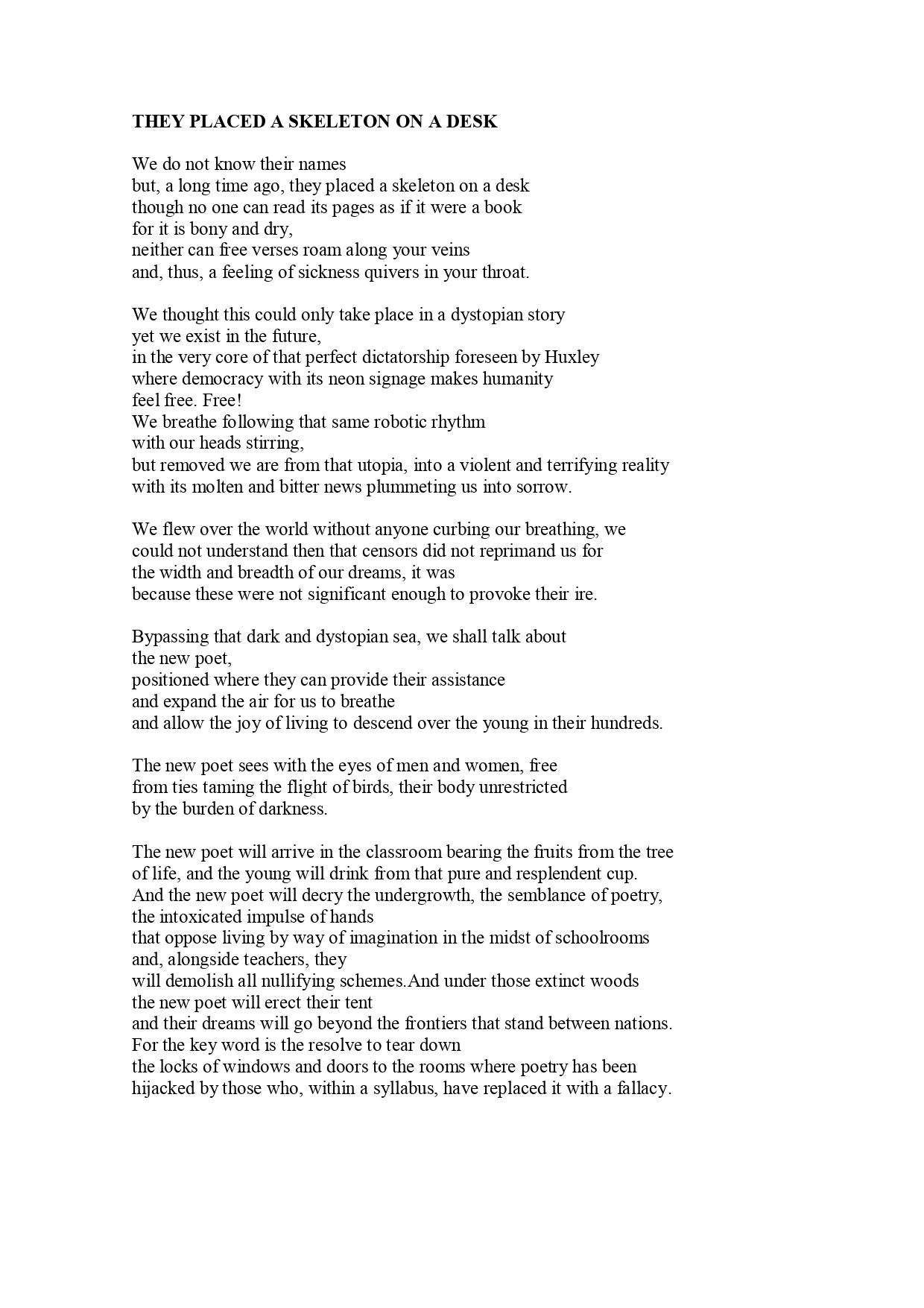
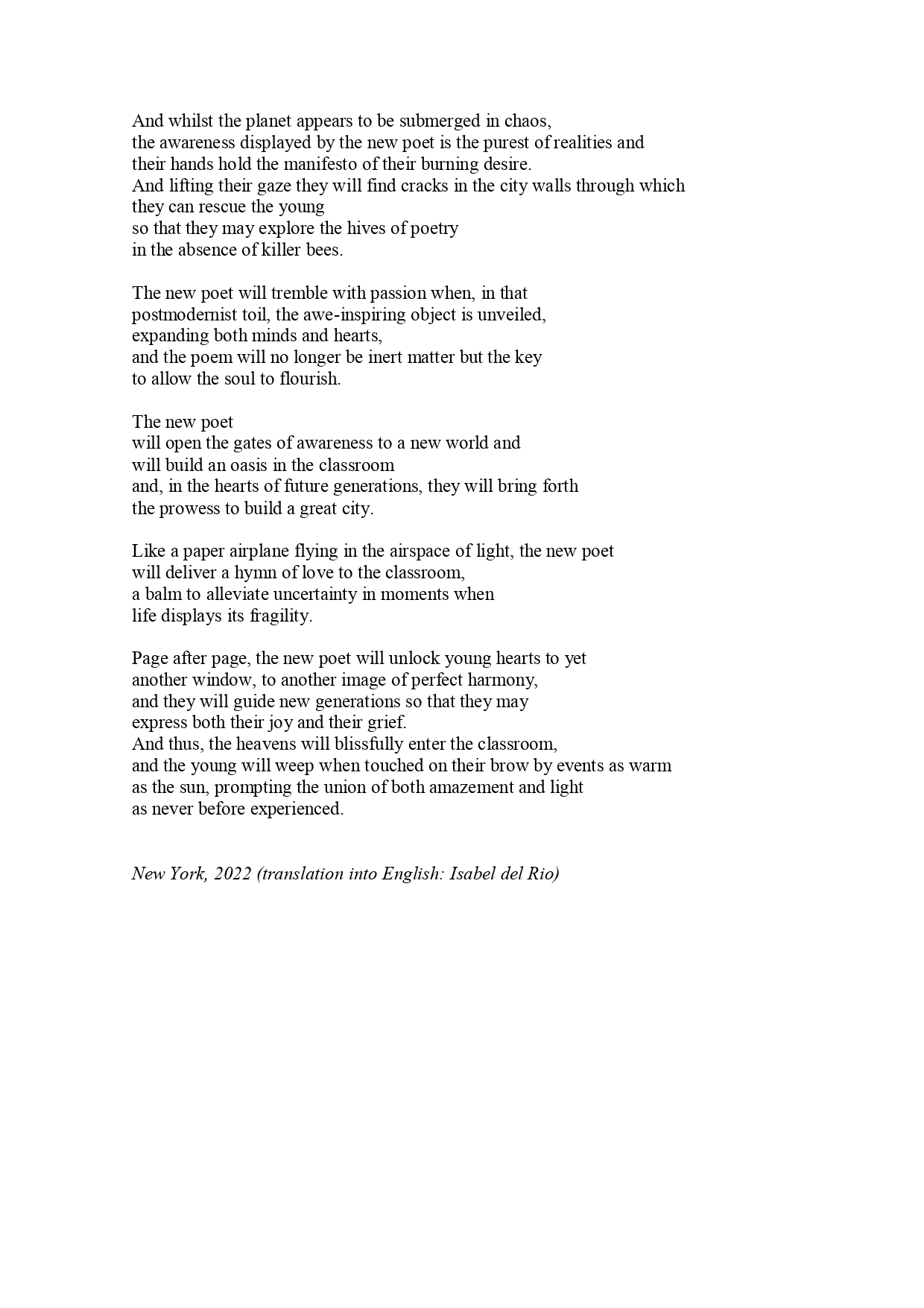
UN ESQUELETO SOBRE EL PUPITRE
No sabemos sus nombres
pero hace años colocaron un esqueleto sobre
el pupitre
nadie lo puede hojear como un libro
porque es ahuesado y seco
tampoco el verso libre entra en la vena
y la náusea tiembla en la garganta
Creíamos que sólo era posible en un relato
distópico
pero existimos en el futuro
en el centro mismo de la dictadura perfecta
predicha por Aldous Huxley
en cuyas membranas de neón la democracia
hace sentir a la humanidad
libre! libre! respirando al ritmo de los robot
cabezas en movimiento
lejos de la utopía en la violenta y espeluznante
actualidad
con noticias líquidas y amargas que hunden
en la
tristeza
Volábamos por el mundo sin que nadie pusiera
freno a nuestra respiración
no comprendimos que el censor
no reprochaba el largo y ancho de nuestros
sueños
porque no eran lo suficientemente grandes
para provocar su iracundo gesto
Soslayando el oscuro mar de la distopía
hablaremos del nuevo poeta
situado donde pueda socorrer
donde logre expandir el oxígeno
y dejar caer sobre cientos de jóvenes el gozo
de vivir
El nuevo poeta tiene ojos de hombre y mujer
libre de la soga que domestica el vuelo de las
aves
un cuerpo sin el peso de la oscuridad
El nuevo poeta descenderá al aula con el fruto
del árbol de la vida
y dará de beber a la juventud de la copa pura
y esplendente
denunciará la hojarasca o remedo de poesía
denunciará el impulso ebrio de la mano
que objeta vivir con imaginación en la sala
de clases
y junto a los maestros destruirán su máquina
de negación
Bajo los bosques extintos
el nuevo poeta levantará su campamento
su sueño traspasará las fronteras
de las naciones
la consigna es la determinación de romper
ligaduras de ventanas y puertas de habitaciones
donde yace la poesía secuestrada
por quienes han plantado en los programas
escolares
una falacia de ella
Mientras el planeta parece sumergirse
en el caos
la consciencia del nuevo poeta es la realidad
más pura
en su mano está el manifiesto de su ardiente
deseo
levantar el arco de la mirada y hallar la grieta
en los muros de la ciudad
por donde rescatar a la juventud y hacerla
explorar la colmena de la poesía
sin abejas asesinas
El nuevo poeta temblará de pasión al develar
en el tráfago postmoderno
el objeto maravilloso que expande mente
y corazón
el poema ya no será una materia inerte
sino la llave que hará crecer el alma
El nuevo poeta
abrirá los portales de la conciencia a un
nuevo mundo
edificará en el aula un oasis
levantará en el corazón de las nuevas
generaciones
la capacidad de edificar la gran ciudad
Como un avión de papel en el espacio
aéreo de la luz
el nuevo poeta llevará un himno
de amor al aula
un bálsamo que pueda aliviar
la incertidumbre
cuando la vida enseña su fragilidad
Hoja por hoja abrirá el corazón de la juventud
a otra ventana
a otra imagen de perfecta armonía
el nuevo poeta guiará a las nuevas generaciones
a expresar sus alegrías y sufrimientos
el cielo entrará con gozo a la sala de clases
la juventud llorará cuando en sus frentes algo
cálido como el sol
los reúna con el padre y la madre que nunca
tuvieron
unión de asombro y luz
Abajo: Tertulia en el Village de Nueva York, organizado por Poetic Education for the World (2022) donde se propuso formalmente la idea de construir al Nuevo Poeta







Maureen H. Altman-Agustín Benelli-Margarita Drago-Esteban Escalona-Tomás Modesto Galán-Linda Morales Caballero-Juana M. Ramos-Gabriela Rivera-Yrene Santos-Mónica Sarmiento-Archer-Rocío Ochofen-Keila Vall de la Ville-Carlos Velásquez Torres
PEFTW
- EL NUEVO POETA
En el Village, Nueva York, NY, se realizó un encuentro poético en octubre del 2022, con destacados poetas radicados en NYC. Fue una noche mágica en la que se abrazó a la poesía en las diversas voces presentes. Varios de los participantes son catedráticos y gestores culturales, lo cual propició una conversación espontánea acerca del concepto del nuevo poeta. Los presentes mostraron interés respecto a llevar a la poesía a un sitial más alto en la sociedad y de esta coincidencia de pensamiento nació el manifiesto del nuevo poeta. Este encuentro vivificó el deseo de seguir trabajando en nombre de la poesía y de continuar compartiendo nuestra obra poética.
Las siguientes líneas destacan mi punto de vista sobre el nuevo poeta. Los poetas llevan a cabo la noble labor de presentar a la poesía a través de su obra, de la creación de libros, seminarios, conferencias, festivales, intervenciones en diversas aulas, etc. Mas, adicionalmente los poetas pudieran llegar a tener una inquietud por ir más lejos al interpelar a las autoridades comprobando la necesidad de implementar cambios en el currículo escolar, con la finalidad de que la poesía sea materia para estudiar. Los beneficios de la poesía en la sociedad y en los jóvenes constituyen la base que impulsa al llamado nuevo poeta. El nuevo poeta no es más que aquél o aquella quien defiende el derecho de las nuevas generaciones de conocer a la poesía en sus diversas facetas desde los años escolares. Adicionalmente a la belleza que porta, a la importancia de su expresión artística, su rol en la comunicación, la literatura y como patrimonio cultural, hace falta analizar a la poesía en otras facetas,como por ejemplo en relación con la neurociencia, como educadora, sanadora y reconciliadora de la humanidad, entre otras.
Los nuevos poetas no pretenden catalogarse como diferentes o superiores en ningún aspecto. Son, por el contrario, servidores de la poesía y de la humanidad. Tienen como bandera la humildad. Sin esta, no podrían ser verdaderos servidores de la paz y de la justicia que trae la poesía. Andarán sin duda por terrenos ásperos en aras de esta paz y justicia pues su misión conlleva esfuerzo, entrega y de ningún modo es fácil o ligera. Los nuevos poetas no buscan exaltarse, sino exaltar a una verdad mayor como lo es la poesía.
A partir del beneficio que la poesía manifiesta en nuevas generaciones, las cuales están siendo manipuladas por sistemas contrarios a la paz y la justicia, se entiende que la poesía es un instrumento muy poderoso. Los nuevos poetas podrían entonces portar una de las "armas" más revolucionarias de la historia como bien lo es la poesía, arma de paz, de hogar, de autoconocimiento, belleza, amor y justicia. Los llamados esperanza del futuro requieren de nuevos poetas quienes dediquen su valioso tiempo no solo para crear su también valiosa obra, sino destinen una fracción de su tiempo a ser parte de esta fuerza que persigue una reforma educativa. Qué mejor que insistir en la implementación de la poesía como materia a estudiar en lo cotidiano e íntimo como lo puede ser un salón de clase. Se necesita de cuantiosos nuevos poetas, para establecer una fuerza contraria a la distopía que se posiciona en nuestras sociedades y se afirma en el campo educativo. La invitación se extiende para unir fuerzas en la creación de un hogar u oasis a través de la poesía, con el que las nuevas generaciones puedan contar y desde allí colaborar con aquello que constituye una utopía, pero a la vez es el derecho de todos, un mejor mañana.
Maureen Altman
Directora Asociada de Educación Poética para el Mundo
PEFTW
- THE NEW POET
In the Village, New York, NY, a poetry meeting was held in October 2022, with prominent poets based in NYC. It was a magical night in which poetry was embraced in the diverse voices present. Several of the participants are professors and cultural managers, which led to a spontaneousconversation about the concept of the new poet. Those present showed interest in taking poetry to a higher place in society and from this coincidence of thought the new poet's manifesto was born. This meeting invigorated the desire to continue working in the name of poetry and to keep sharing our poetic work.
The following lines highlight my point of view about the new poet. Poets carry out the noble work of presenting poetry through their work, the creation of books, seminars, conferences, festivals, interventions in various classrooms, etc. But additionally, poets may have a concern to go further by questioning the authorities, verifying the need to implement changes in the school curriculum, with the aim of making poetry a subject to study. The benefits of poetry in society and in young people constitute the basis that drives the so-called new poet. The new poet is nothing more than the one who defends the right of the new generations to know poetry in its various facets since school years. In addition to the beauty it carries, the importance of its artistic expression, its role in communication, literature, and as cultural heritage, it is necessary to analyze poetry in other facets, such as in relation to neuroscience, as an educator, healer, and reconciler of humanity, among others.
The new poets do not intend to classify themselves as different or superior in any aspect. On the contrary, they are servants of poetry and humanity. They have humility as their flag. Without it, they could not be true servants of the peace and justice that poetry brings. They will undoubtedly walk through rough terrain for the sake of this peace and justice because their mission entails effort, dedication and is in no way easy or light. The new poets do not seek to exalt themselves, but rather to exalt a greater truth such as poetry.
Based on the benefit that poetry manifests in new generations, which are being manipulated by systems contrary to peace and justice, it is understood that poetry is a very powerful instrument. The new poets could then carry one of the most revolutionary "weapons" in history, such as poetry, a weapon of peace, of home, of self-knowledge, beauty, love, and justice. Those called hope for the future require new poets who dedicate their valuable time not only to create their own valuable work, but who may also dedicate a fraction of their time to be part of this force that pursues educational reform. What better than to insist on the implementation of poetry as a subject to be studied in the everyday and intimate that a classroom can offer. Numerous new poets are needed to establish a force contrary to the dystopia that is positioned in our societies and is affirmed in the educational field. The invitation is extended to join forces in the creation of a home or oasis through poetry, which new generations can count on and from there collaborate with that which constitutes a utopia, but at the same time is the right of everyone, a better tomorrow.
Maureen Altman
Associate Director of Poetic Education for the World
Translation to English by M. Altman


Sesión en defensa del Nuevo Poeta, realizada en la ciudad de Concepción-Chile (26 de abril de 2023)
Programa Horizontes de nuestra América, segmento animado por la poeta argentina Kari Krenn. Cabina 11 cadena global (Nuevas y necesarias reflexiones sobre el sentido del Nuevo poeta)
Traducción al griego por la poeta, Agathi Dimitrouca

Έναςσκελετόςπάνωστοθρανίο
Δεν τα γνωρίζουμε ταονόματά τους
αλλά πριν από χρόνια έβαλαν έναν σκελετό πάνω στο θρανίο
κανένας δεν μπορεί να τον φυλλομετρήσει σαν βιβλίο
γιατί'ναικοκαλιάρικος ξερός
κι ούτε ο ελεύθερος στίχος δεν μπαίνει στη φλέβα
και η ναυτία τρέμει στον λαιμό
Πιστεύαμε πως ήταν εφικτό αυτό μόνο σ' ένα δυστοπικό αφήγημα
αλλά υπάρχουμε στο μέλλον
στο επίκεντροτης τέλειας δικτατορίας που προφήτεψε ο Άλντους Χάξλεϊ
όπου στις μεμβράνες της από νέον η δημοκρατία κάνει την ανθρωπότητα να νιώθει
ελεύθερη! ελεύθερη!
αναπνέοντας στον ρυθμό των ρομπότ
κεφάλια σε κίνηση
αλλά μακριά από την ουτοπία μέσα στη βίαιη και ανατριχιαστική επικαιρότητα
με ρευστές πικρές ειδήσεις που βυθίζουν στη θλίψη
Πετούσαμε σ' όλο τον κόσμο χωρίς κανένας να μας φράζει την ανάσα μας
δεν καταλάβαμε πως ο λογοκριτής
δεν απέρριπτε το μήκος και το πλάτος των ονείρων μας
επειδή δεν ήταν αρκετά μεγάλα για να προκαλέσουν τον οργισμένομορφασμότου
Αφήνοντας στην άκρη τη σκοτεινή θάλασσα της δυστοπίας
θα μιλήσουμε για τον νέο ποιητή
τοποθετημένον εκεί όπου μπορεί να βοηθήσει
εκεί όπου θα κάνειτο οξυγόνονα εξαπλωθεί
και θ' αφήσει να πέσει πάνω σ' εκατοντάδες νέους η χαρά της ζωής
Ο νέος ποιητής έχει ανδρικά και γυναικεία μάτια
απαλλαγμένος από τη θηλιά που εξημερώνει το πέταγμα των πουλιών
σώμα χωρίς το βάρος του σκοταδιού
Ο νέος ποιητής θα κατεβεί στην αίθουσα με τον καρπό του δέντρου της ζωής
και θα δώσει στη νεότητανα πιεί από το πεντακάθαρο κι αστραφτερό κύπελλο
θα καταγγείλει την περιττολογία και την απομίμηση στην ποίηση
θα καταγγείλει τη μεθυσμένη παρόρμηση του χεριού
που αρνείται να ζει με φαντασία μέσα στην αίθουσα διδασκαλίας
και μαζί με τους δασκάλους θα καταστρέψει τον μηχανισμό άρνησής του
Κάτω από τα εξαφανισμένα δάση
ονέος ποιητής θα στήσει το στρατόπεδότου
τ' όνειρό του θαπεράσει τα σύνορα των χωρών
το σύνθημα είναι η αποφασιστικότητα να σπάσει
μεντεσέδες σε παράθυρα και πόρτες δωματίων
όπου κείτεται η ποίηση απαχθείσα
από εκείνους που φύτεψαν στα σχολικά προγράμματα
ένα ψευδεπίγραφό της
Ενώ ο πλανήτης φαίνεται να βυθίζεται στο χάος
η συνείδηση του νέου ποιητή είναι η πιο καθαρή πραγματικότητα
στο χέρι του είναι το μανιφέστο του διακαούς πόθου του
να σηκώσει το τόξο του βλέμματος και να βρει τη ρωγμή στα τείχη της πόλης
μέσα απ' την οποία θα διασώσει τη νεότητακαι θα την κάνει να εξερευνήσει
την κυψέλη της ποίησης
χωρίς δολοφονικές μέλισσες
Ο νέος ποιητής θα τρέμει από πάθος ανακαλύπτοντας στη μεταμοντέρνα δίνη
το θαυμαστό αντικείμενοπου διευρύνει νου και καρδιά
το ποίημα πια δεν θα είναι ύλη αδρανής
αλλά το κλειδί που θα κάνει την ψυχή να μεγαλώσει
Ο νέος ποιητής
θ' ανοίξει τις πύλες της συνείδησης σ' έναν καινούργιο κόσμο
θα χτίσει μέσα στην αίθουσα μια όαση
θα υψώσει στην καρδιά των νέων γενεών
την ικανότητα να χτίσουν τη μεγάλη πόλη
Σαν ένα χάρτινο αεροπλάνο στον αέρινοχώρο του φωτός
ο νέος ποιητής θα φέρει έναν ύμνο αγάπης μέσα στην αίθουσα
βάλσαμο που θ' απαλύνει την αβεβαιότητα
όταν η ζωή διδάσκει την ευθραυστότητά της
Φύλλο το φύλλο θ' ανοίξει η καρδιά των νέων σε άλλο παράθυρο
σε άλλη εικόνα τέλειας αρμονίας
ο νέος ποιητής θα οδηγήσει τις νέες γενιές
να εκφράσουν τη χαρά και τονπόνο τους
ο ουρανόςθα μπει μ' ευχαρίστηση στην αίθουσα διδασκαλίας
η νεότητα θα δακρύσει όταν στα μέτωπά τους κάτι ζεστό σαν τον ήλιο
θα τους σμίξειμε τον πατέρα και τη μητέρα που ποτέ δεν είχαν
ένωση θαυμασμού και φωτός
ΝέαΥόρκη, 2022
Traducción al italiano por el poeta Franco Boza y revisado por el poeta Pasqualino Buongiovanni


UNO SCHELETRO SUL BANCO DI SCUOLA
Non sappiamo i loro nomi
ma da anni hanno messo uno scheletro sul banco di scuola
nessuno può sfogliarlo come un libro
perché è ossuto e secco
neanche il verso libero entra nelle vene
e la nausea trema in gola.
Credevamo che fosse possibile soltanto in un racconto distopico
ma esistiamo nel futuro
al centro stessodella dittatura perfetta predetta da Aldous Huxley
nelle cui membrane al neon la democrazia fa sentire l'umanità
libera! libera!
respirando al ritmo dei robot
teste in movimento
ma lontane dall'utopia della violenta e spaventosa attualità
con notizie liquide e amare che sprofondano nella tristezza.
Volavamo per il mondo senza che nessuno ponesse un freno al nostro respiro
non comprendemmo che il censore
non rimproverava la lunghezza e l'ampiezza dei nostri sogni
perché non erano abbastanza grandi da provocare il suo gesto d'ira.
Eludendo il mare oscuro della distopia
parleremo del nuovo poeta
situato dove possa prestare soccorso
dove riesca a espandere l'ossigeno
elasci cadere su centinaia di giovani la gioia di vivere.
Il nuovo poeta ha occhi da uomo e da donna
libero dal cappio che doma il volo degli uccelli
un corpo senza il peso dell'oscurità.
Il nuovo poeta scenderà in aula con il frutto dell'albero della vita
e darà da bere ai giovani dal calice puro e splendente
denuncerà il seccume o l'imitazione della poesia
denuncerà l'impulso ebbro della mano
che si oppone a vivere con immaginazione in classe
e con gli insegnanti distruggeranno la loro macchina di negazione.
Sotto le foreste estinte
il nuovo poeta alzerà le sue tende
il suo sogno attraverserà i confini delle nazioni
la parola d'ordine è la determinazione a rompere
i vincoli delle finestre e delle porte delle stanze
dove giace la poesia rapita
da coloro che hanno piantato nei programmi scolastici
una sua fallacia.
Mentre il pianeta sembra precipitare nel caos
la coscienza del nuovo poeta è la realtà più pura
nella sua mano c'è il manifesto del suo ardente desiderio
di sollevare lo sguardo e trovare la crepa nelle mura della città
attraverso cui salvare la gioventù e farle esplorare l'alveare della poesia
senza api assassine.
Il nuovo poeta tremerà di passione quando svelerà nel trambusto postmoderno
il meraviglioso oggetto che espande mente e cuore
la poesia non sarà più materia inerte
bensì la chiave che farà crescere l'anima.
Il nuovo poeta
aprirà i portali della coscienza a un nuovo mondo
edificherà nell'aula un'oasi
farà sorgere nel cuore delle nuove generazioni
la capacità di costruire la grande città.
Come un aereo di carta nello spazio della luce
il nuovo poeta porterà in classe un inno d'amore
un balsamo in grado di alleviare l'incertezza
quando la vita mostra la sua fragilità.
Pagina dopo pagina aprirà il cuore dei giovani a un'altra finestra
a un'altra immagine di perfetta armonia
il nuovo poeta guiderà le nuove generazioni
a esprimere le loro gioie e sofferenze
il cielo entrerà nell'aula con gioia
i giovani piangeranno quando sulla loro fronte qualcosa di caldo come il sole
li ricongiungerà con il padre e la madre che non hanno mai avuto
unione di meraviglia e di luce.
Nuova York 2022
(Traduzione Franco Boza, revisione Pasqualino Bongiovanni)
Traducción al Alemán, por la poeta Ingeborg Robles

SKELETT AUF DEM PULT
Wir kennen ihre Namen nicht,
aber ein Skelett stellten sie vor Jahrenaufs Pult.
Man kann es nicht durchblättern wie ein Buch,
denn es ist knochentrocken
und kein freier Vers strömt inden Adern,
Übelkeit zittert im Hals.
Als lebten wir in einer dystopischen Erzählung,
doch wir existieren in der Zukunft,
im Herzen der perfekten Diktatur, wie von Aldous Huxley vorhergesehen.
Die Neonmembranen der Demokratie signalisieren:Fühl dich frei. Frei!
Atmen im Rhythmus der Roboter,
Köpfe im Takt,
weit entfernt von einer Utopie befinden wir unsin der brutalen, entsetzlichen Gegenwart,
mit bitterflüssigen Nachrichten, die uns in Traurigkeit stürzen.
Wir flogen durch die Welt, ohne dass jemand unseren Atem kürzte,
wir merkten nicht,
dass unsere grandiosen Träume nur deswegen nicht zensiert wurden,
weil sie einfach nicht groß genug waren, um Zorn zu erregen.
Das schwarze Meer der Dystopie beiseite schiebend
reden wir vom neuen Dichter,
der dort ist, wo er helfen kann,
für mehr Sauerstoff sorgt
und Hunderten von jungen Leuten Lebensfreude bringt.
Der neue Dichter hat Frauen- und Männeraugen,
ist frei vom Strick, der den Vogelflug zähmt,
ein Körper ohne das Gewicht der Dunkelheit.
Der neue Dichter steigt in den Klassenraum herab mit der Frucht des Lebensbaums.
er gibt der Jugend aus dem reinen und glänzenden Kelch zu trinken.
Er wird das Geschwätz, den Abklatsch der Dichtung anklagen
undauch die Hand, die mit trunkenem Impuls die Phantasie aus dem Klassenzimmer vertreibt.
Zusammen mit den Lehrern vernichteter die Maschine des Verneinens.
Unter den ausgestorbenen Wäldern
wird der neue Dichter sein Lager aufschlagen.
Sein Traum überquert die Grenzen aller Nationen,
seine Losung der Wille, die versiegelten Fenster und Türen
der Häuser aufzubrechen, hinter denen die Dichtung gefangen liegt,
Geisel der Schulprogramme und ihrer falschen Vorstellung von Dichtung.
Während unserer Planet im Chaos zu versinken scheint,
ist das Bewusstsein des neuen Dichters die reinste Realität,
in seiner Hand befindet sich das Manifest seines glühenden Begehrens,
den Blick zu heben und den Riss in den Stadtmauern zu finden
durch den er die Jugend rettet und sie den Bienenstock der Poesie erkunden lässt,
unbehelligt von Killerbienen.
Der neue Dichter wird vor Leidenschaft erzittern, wenn er im postmodernen Trubel
das erstaunliche, Geist und Herz erweiternde Objekt enthüllt,
das Gedicht wird nicht länger unbelebte Materie sein,
sondern der Schlüssel, der die Seele wachsen lässt.
Der neue Dichter
wird die Tore der Aufmerksamkeit öffnen für eine neue Welt,
wird im Klassenraum eine Oase errichten,
wird in den Herzen der neuen Generationen,
die Fähigkeit erschaffen, eine große Stadt zu bauen.
Wie ein Papierflugzeugim luftigen Raum des Lichts
wird der neue Dichter eine Liebeshymne in das Klassenzimmer tragen,
Balsam, der die Unsicherheit lindert,
wenn das Leben seine Zerbrechlichkeit zeigt.
Blatt für Blatt wird der neue Dichter die Herzen der Jugend für neue Fenster
und neue Bilder perfekter Harmonie öffnen,
den neuen Generationen wird er zeigen,
wie sie Freude und Trauer ausdrücken können.
Der Himmel wird mit Lust in die Klassenzimmer treten,
die Jugend wird weinen, wenn etwas so Warmes wie die Sonne auf ihrer Stirn
sie mit dem Vater und der Mutter vereint, die sie nie hatten,
eine Verbindung aus Staunen und Licht.
New York 2022
(Deutsche Übersetzung: Ingeborg Robles)
Vivimos en un futuro distópico, un sistema de vestiduras democráticas que nos hace creer que somos libres. Podemos escribir sin censura, desplazarnos por el mundo, participar en festivales, encuentros, lecturas; publicar sin que nadie lo impida. No obstante, esta es una libertad artificial, la de un régimen que nos tiene donde nos quiere tener: existiendo sin una mayor influencia en el planeta, distinguiendo a unos mientras va silenciando a otros y, con esta selección arbitraria, perpetuando el injusto status quo establecido por los poderes imperantes.
¿Pero qué ocurriría si como poetas tomamos conciencia plena de esta realidad y decidimos ingresar al aula rompiendo el Establishment, situándonos en el centro mismo de una oportunidad trascendental para ser la influencia auténtica, innegable y positiva que pueda alcanzar el corazón de miles y hasta de millones de estudiantes?
Hoy la humanidad requiere que edifiquemos al Nuevo Poeta, un ser que tendrá clara conciencia para sobrevivir en la sociedad enajenante que destruye lo esencial de lo humano, que secuestra a la poesía, que hace que la juventud permanezca por muchos años en el sistema educativo sin experimentar el desarrollo de la verdadera dimensión lírica, sin experimentar el poder iluminador de ella en el camino, concluyendo sus estudios básicos y medios al igual que sus padres, con la creencia mayoritaria de que la poesía no tiene ningún valor y que tan sólo es el quehacer ilusorio de unos individuos que habitan los márgenes de la realidad.
El mundo se desintegra en la violenta y oscura actualidad de sus acontecimientos. Las ciudades del planeta tambalean entre el ruido, la guerra, la pobreza y en estas tierras baldías, el Nuevo Poeta necesita levantar su campamento de luz e invocar las insignias léxicas de su misión, trabajar para liberar de la invisibilidad a la poesía, sacarla de aquel lugar engañoso donde la han instalado el caos y los demiurgos de turno.
Al Nuevo Poeta debe animarle el deseo de luchar por crear los espacios necesarios para que las nuevas generaciones conozcan el alcance y la importancia de los versos; enseñarles a utilizar una herramienta inequívoca para expresar sus alegrías y sufrimientos; una herramienta verbal que también es un bálsamo para sobrellevar la incertidumbre y angustia que la existencia misma genera por su fragilidad.
El Nuevo Poeta nunca será cómplice de un sistema que oculta los valores profundos de la poesía, enfocará su trabajo no solamente en la creación de su obra poética, sino que con los medios que tenga a su alcance, se esforzará por encontrar la grieta en el sistema, para infiltrarlo y confabular instancias nobles donde logre guiar a la juventud a descubrir la maravillosa cosmogonía poética.
El Nuevo Poeta sentirá la responsabilidad enorme de dar a conocer los secretos de los versos, para que la sociedad se percate de la falta que nos hacen, no solo en el aula sino también en la vida. En ese contexto lo primordial y urgente es trabajar con paciencia y abnegación en unión con otros individuos, para provocar una reforma en los sistemas educativos del mundo que permita a grandes grupos de jóvenes conocer lo que se les oculta hoy en día, los procesos y los frutos de una escritura alada, los dones incandescentes de la metáfora.
El Nuevo Poeta se esforzará para que la juventud, en su gran mayoría, viva una experiencia poética satisfactoria en su lugar de estudios y con esta praxis encender aquella dimensión espiritual que tiene el poder para salvar al mundo de la banalidad, la distracción y el abismo. En este contexto el Nuevo Poeta edificará en el aula un OASIS para los estudiantes, de tal modo, sembrará poco a poco en el alma de las nuevas generaciones la capacidad para edificar una sociedad sana, inspirada y justa.
Website: metaforologia.com Publicado por Ana C. Blum (2022)
Hacer click en entrevista y artículo, para mayor información en castellano


